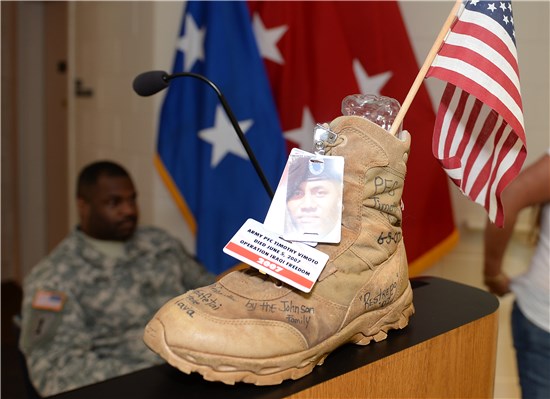
Commentary by: Capt. Martha Nigrelle
AUSTIN, Texas – A serious injury or illness often means an extended stay in a hospital with numerous follow up appointments during the recovery period. For many service members this means a lengthy visit in or near a military hospital to receive care from military providers. During this time, loved ones might spend a large sum of money to be there for their service member, or in the worst case scenario, because the cost of hotels and plane fare is too expensive, that service member won’t have a loved one by his or her side.
The Fisher House Foundation was created to help military families during these times.
Theresa Johnson, Fort Hood Fisher House volunteer, spoke with soldiers assigned to the Joint Force Headquarters, Texas National Guard about the services Fisher Houses around the world offer, in a presentation July 12, 2014 at Camp Mabry in Austin.
“This training is very important,” said Maj. David Tyler, commander, Joint Force Headquarters, Texas Military Forces. “This is a benefit that a lot of Texas National Guard soldiers don’t know about.”
Johnson told soldiers how she started volunteering at the Fisher House at Fort Campbell in Kentucky, and has since volunteered with a Fisher House in Hawaii and Fort Hood in Texas.
“It’s like a hotel with no maids,” said Johnson, explaining that the Fisher House is a home available to the loved ones of any military patient being seen at nearby military medical facilities.
The only requirement for staying at a Fisher House is that the service member being seen must have a military identification card. For the loved ones, Fisher House will never ask to see military orders or a military identification card, making it possible for parents, aunts, uncles, cousins, significant others and friends to stay at the Fisher House.
“I’m glad we had this training,” said Sgt. 1st Class Pablo Martinez, Joint Force Headquarters, Texas Military Forces. “I knew injured people went to Fisher Houses. I didn’t know families could go, too. I think this should be mandatory training for everyone in the military.”
The Fisher House also helps family members purchase plane tickets and pay for hotel rooms, if a Fisher House is unavailable, Johnson said.
Anyone can donate frequent flyer miles and hotel points to the Fisher House Foundation, and the Foundation then uses those miles and hotel points to pay for family members who need help getting to their loved one.
“My son got into a car accident that almost took his life,” said Johnson. Following this, the Fisher House Foundation paid for her plane ticket and put her up in a Fisher Home while her son was recovering. "If you have ever donated your frequent flyer miles to Fisher House, I want to thank you. That paid for my plane ticket to see my son when he needed me,” she said.
This year, the Fort Hood Fisher House is organizing a “Fallen Hero Remembrance Run, Walk or Roll 8K” to honor service members who made the ultimate sacrifice. Johnson said her goal is to collect 7,000 combat boots, one for every service member who lost their life since 9/11. Each boot will have a picture attached to it for the service member it represents. These boots will be displayed in a field on Fort Hood during the event Nov. 1, 2014, there.
“There is no cost. They’ve already paid the price,” said Johnson.
Anyone can participate in the event. The unit that has the most service members participate will receive a bronzed set of combat boots. Johnson is still looking to collect old combat boots. With only about 1,000 collected so far, she has a long way to go.
For members of the Texas Military Forces wishing to donate, Sgt. Brandon Ancar, with Joint Force Headquarters, will be collecting boots for Johnson in the Joint Force Headquarters orderly room in Building 8 on Camp Mabry.
There are 45 Fisher Houses in the United States, seven located right inside of Texas in Dallas, El Paso, Fort Hood, San Antonio and Houston, there are even two Fisher Houses located overseas in Germany and the United Kingdom. According to foundation records, upon completion of each home, the Fisher House Foundation donates the home to the U.S. government as a gift and each home is run as a non-profit organization primarily on donations.
Fisher House is for all service members, National Guard, Reserve or Active, Army, Air Force, Navy, Marine or Coast Guard.
“Fisher House is about being a family,” said Johnson. “I want you to know we are just down the street. We’re there for you.”
For more information on the Fisher House Foundation visit the website at www.fisherhouse.org. For more information on the Fort Hood Fisher House visit the website www.crdamc.amedd.army.mil/fisher/ or Facebook fort hood fisher house